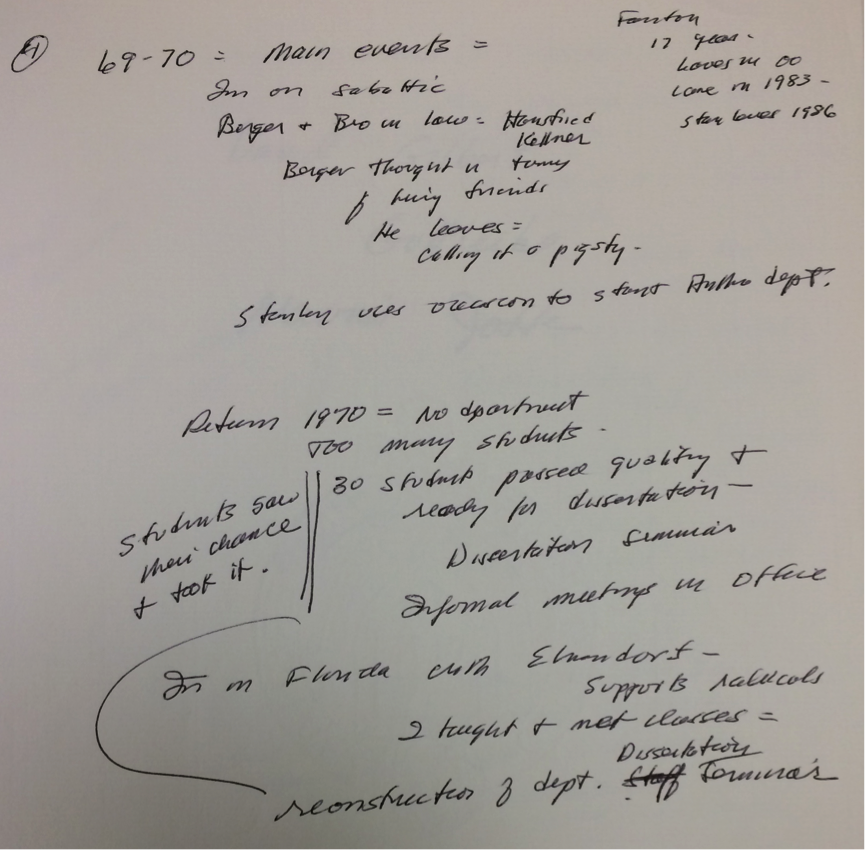by Heather Anderson, MA Anthropology '18
Stanley Diamond was an anthropologist and poet who founded The New School’s graduate anthropology program in 1970. The program soon developed into a full department, of which he served as its chairman until 1983 when he was made Distinguished Professor of Anthropology and Humanities and University Poet. [1]
Born in 1922 to a progressive and intellectual Jewish family, Diamond demonstrated an early interest in civil rights and social justice. [2] He attended the University of North Carolina for two years, completing his undergraduate degree at New York University in 1942 with majors in philosophy and English.
During World War II, Diamond joined the British Army field Service, serving in North Africa. He would return to Africa for his graduate studies and throughout his career (notably Ghana and Nigeria). [3] He went on to graduate school on the G.I. Bill, receiving a PhD in anthropology from Columbia University in 1951. Diamond was influenced by the anti-racism writing of founding faculty member, Franz Boas (by then deceased) and rejected a portrait of African societies as inferior, static, and simple. Instead, he wrote a dissertation titled – Dahomey: Dynamics of a Proto-State – which studied the transition from kinship to kingship as a model for state formation. Thus, Diamond made the case that the governance of Dahomey was complex, dynamic and sophisticated in ways “barely imaginable in oppressive state and bureaucratic societies” [4] – a radical conclusion for anthropology of this period.
Diamond’s first teaching position was at the University of California at Los Angeles in 1953. He did not hold this position for more than a year, being soon dismissed for denouncing McCarthyism. Unable to find another teaching position, Diamond used the time to conduct ethnographic fieldwork in an Israeli kibbutz and Palestinian village. This research was conducted as a fellow for the Social Science Research Council (1951 – 1953). He later secured a teaching position at Brandeis University (1956 – 1961) and a professorship at Syracuse University (1963 – 1966).
Diamond joined the Graduate Faculty of Political and Social Science at The New School in 1966. At the time, there was no distinct anthropology program. In 1970, Diamond played a key role in the division of the anthropology and sociology disciplines into separate departments, and became chair of the Committee on Anthropology. The precise events leading to the disciplinary split are unclear. However, a handwritten chronology, written by sociologist Arthur Vidich and contained in the Arthur J. Vidich papers held by the New School Archives, gives some clue. According to these notes, the “main events” leading to the split include his own sabbatical and the Chair of Sociology, Peter Berger’s, discontent with faculty hires prompting his departure (“calling it a pigsty”). Vidich concludes: “Stanley uses occasion to start Anthro dept.”

The additional note “students saw their chance and took it” must be referring to the 1970 student strike in protest of America’s Cambodia Campaign. (Diamond and colleague Edward J. Nell wrote an essay in support of students in the New York Review of Books later that year.)
Correspondence from early 1970 contained in the Vidich papers, notably from Dean Greenbaum and sociologist Benjamin Nelson, suggests administrative and procedural dysfunction (and the concomitant disapprobation felt by faculty) had some part to play in the split. In particular, the correspondence points to departmental meetings being called without notice or quorum. Despite these rocky beginnings, Diamond remained Chair of Anthropology for the next fourteen years, shaping the department’s curriculum, faculty and mission. During his tenure, he was involved in the New York State evaluation of the doctoral program and reorganization of the social science departments.
Academically, Diamond promoted a critically engaged anthropology. In 1975, he established Dialectical Anthropology, a Marxist peer-reviewed academic journal. In its first decade of publication, articles often expressed anti-war politics. Diamond edited the journal, which continues to this day, until his death in 1991.
Towards the end of his time at the School, Diamond established and incorporated an Institute for Critical Anthropology. In May 1984, Diamond outlined the Institute’s “emancipatory” purpose:
to provide an arena for liberatory social-cultural thought as it has begun to emerge in the confrontation with the ultimate and menacing worldwide problems that demand our deepest attention.
Although the longevity of the Institute is unclear, it is possibly an antecedent of the Institute for Critical Social Inquiry at The New School. In keeping with Diamond’s activist academia, in 1984 he also spearheaded a teach-in about the “nuclear crisis”, calling on his colleagues to cancel classes and attend a program about disarmament instead. His legacy of radical and critical anthropology continues to distinguish anthropological study and practice at The New School from other programs in the United States.
Diamond’s best-known book in the field of anthropology is In Search of the Primitive: A Critique of Civilization (1974). However, it was as a poet that Diamond most identified. He published two books of poetry, Totems and Going West, and promoted the work of other poet-anthropologists. After concluding his chairmanship of the Anthropology Department, Diamond created and occupied the position of University Poet. He died at the age of 69 in New York City in 1991.
The New School Archives holds a collection of Stanley Diamond’s papers. The collection documents his work as scholar, author, researcher, teacher, editor, poet and university administrator. Materials include ethnographic fieldwork, syllabi and lecture notes, conference materials, typescripts and offprints of writings authored by Diamond, as well as by colleagues. Correspondence in the collection represents Diamond’s deep engagement with an international circle of colleagues.
Sources
[1] “Stanley Diamond Dies; An Anthropologist, 69.” New York Times obituary (1991).
[2] Mbabuike, Michael C. 1994. “Stanley Diamond and the dialectics of his African encounter”. Dialectical Anthropology vol. 19, no.2-3, p. 139.
[3] Ibid, p. 138.
[4] Ibid.
NSSR News. Website: https://twitter.com/NSSRNews/status/832291512021041153